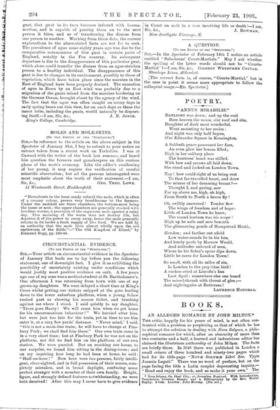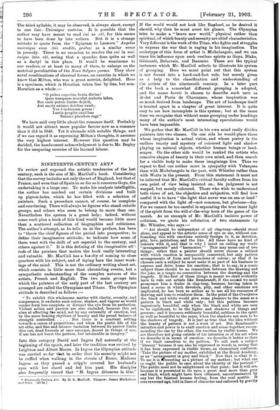BOOKS.
AN ALLEGED ROMANCE BY JOHN MILTON.* THE critic, happily for his peace of mind, is not often con- fronted with a problem so perplexing as that of which he has to attempt the solution in dealing with Nova Solyma, a philo- sophical romance for which, after an obscurity of more than two centuries and a half, a learned and industrious editor has claimed the illustrious authorship of John Milton. The facts are briefly these. In 1648 there was published in London a small octavo of three hundred and ninety-two pages which had for its title-page "Nov.& SOLYM.M Libri Sex. Typis Joe/ails Legati." There was no word of preface, but on the page facing the title a Latin couplet deprecating inquiry,— "Read and enjoy the book, and so make it your own." The • Nova SoLytna, the Ideal City; or. Jerusalem Regained. With Introduction. Translation, Literary Essays, and a Bibliography by the Rev. Waiter Begley. 2 vols. London: John Murray. [21s. net.] following year there was a second edition, consisting of the unsold copies with a new title-page and the same motto. The difference of the title-page was that a sub-title, " Sive Institntio Christiani," was added, and a brief table of con- tents. To this title-page the old verse motto was trans- ferred. The name of a publisher was also given. The book was printed by Johannes Legatus, but sold by Thomas Underhill at the ' Sign of the Bible ' in Wood Street. From that day to the time when Mr. Begley came across it, and elaborated the theory of a Miltonic authorship, it was, so to speak, never heard of. Absolutely no mention is made of it. That two people at least have read it, or part of it, in time past is proved by the fact that in the British Museum copy some one has attributed it to Emanuel Swedenborg, a theory summarily disposed of by another scribe with the words, " Stuff. Swedenborg born 1688 died 1772." Experts pro- nounce that the book was unquestionably printed from Legat's type. That this type was then in his possession is doubtful, for his name does not appear among the printers of the year. All this, however, is of very little importance. The important fact is that a book of a quite unusual class was published in 1648. No one can doubt, even after a brief inspection, that it is unusual, and we have to conjecture who wrote it. Mr. Begley's answer is,—John Milton.
This answer is, of course, a priori highly improbable. There is nothing quite parallel to it in the history of literature. There have been literary discoveries of various kinds, but hardly one that can be matched with this. Milton was not as great a personage in the eyes of his contemporaries as he is in ours ; still, he was a prominent man, prominent as a politician, as a controversialist, as a man of letters. In 1648, indeed, he was not so important as he was six or seven years later ; but he ranked as high as any man of his time, the great divines, Parliamentarians, and soldiers excepted. How was it that the book fell so dead, that no one noticed it either then or afterwards, that he himself—perhaps the strangest thing of all—never referred to it ? These are formidable difficulties. Yet it is impossible to deny that there is much weight in Mr. Begley's arguments.
Nova Solyma, a title fairly represented by the Miltonic " Jerusalem Regained," opens in the familiar style of romance. Three youths on horseback are seen approaching a city which we recognise as being, with a difference, the New Jerusalem of the Apocalypse. The leader, Joseph by name, is a native, his companions are Englishmen. Joseph is recognised by his father, who takes the party to his house, and entertains them, first with a meal, then with a discourse on education, which is certainly Miltonic, and curiously anticipatory of modern ideals. " Inspectors and Directors of Education," "public discourses held in all parts of the land," "no one with natural endowments of a higher order allowed to remain unnoticed and neglected from the obscurity of his birth," were not commonplaces in the seventeenth century. The same subject is continued in the same chapter, where a long lecture on allegorical form is delivered by an aged dame to Joseph's young brothers. Indeed, it recurs again and again throughout the book, and seldom without some Miltonic characteristics. In the first chapter of Book III., for instance, Joseph pays a visit to his old College, and occasion is taken to describe academical arrangements, discipline, and study. Not the least curious detail is the remark made by the vener- able " head-tutor " when he welcomes the visitor as one re- turned from the dead. " The threni and epicedia to your memory are all but published," he says. We are certainly reminded of the laments for Edward King, tutor of Christ's College, Cambridge, all of them now forgotten except the immortal " Lycidas." Mr. Begley remarks that such memorials of private persons were not common.
Other Miltonic characteristics might be mentioned, among them a lofty morality, which does not, however, exclude a certain warmth of descriptive colour, a frequent combination in the Milton whom we know. But we may pass at once to a matter which furnishes the strongest evidence for Mr. Begley's con- tention, a matter, too, which admits of convenient statement within the limits of a review. Nina Solyma is manifestly the work of one who possessed an uncommon command of Latin, along with much literary power. This exactly describes Milton. He was a great Latinist, not a Ciceronian by any means; he freely used the terms of the Silver Age, and even
of ages which were not even silver, but he moved as easily, it may be said, in the language as any man of his time. In exact scholarship he had superiors, but not in a ready mastery of its constructions and its vocabulary. And when we descend from this general statement to particulars, we find some very curious confirmations of the theory of a Miltonic authorship. The vocabulary, as has been suggested above,
is remarkable, showing especially a notable similarity with the Latin of Milton's acknowledged prose and verse. There is, for instance, an uncommon word, statuminare, used by Colu- mella for " to prop." Milton, with whom Columella was a favourite author, employed this word in a College exercise. (statuntinare argumento), and again in the posthumously pub- lished De Doctrina Christiana, where he substitutes statuminat for the Vulgate suscipiens in Psalm cxlvii. 6, "The Lord lifteth up the meek." Then there is a somewhat rare though classical use of castigatum as an epithet of pectus in the description of Joseph's sister, who takes the part of the " Daughter of Zion" in the Encaenia of the New Jerusalem. This, too, is connected, though not so closely, with Milton. A devotion to the use of diminutives may also be mentioned as Miltonic. But the most powerful evidence is found in the verse. There is a great quantity of verse in a great variety of metres in the Nova Solyma. Chap. 1 begins with some hexameters about spring.
One of Joseph's young brothers sings a song on the same subject in chap. 2. There are three lyrics in chap. 3. Book II. opens with a soliloquy of Abraham as he ascends Mount Moriah. This is in iambics, and we know that Abraham from .11forea, a drama, was one of the "title-
pages " which Milton puts down in his College catalogue of designs, and the second chapter of the same book is half
occupied with a lyric beginning, " 0 Sacrum Solyma] jugum." We are reminded of the invocation in Paradise Lost, "Say,
Heavenly Muse, that on the secret top Of Oreb." (Curiously enough, Bentley conjectured " sacred " for " secret.") Later on we come to fragments of an "Armada Epic," which is sup- posed to be the work of Joseph. It begins with a council of the gods, " who, having anxiously observed the advance and increase of the true religion in Germany, and yet more in England," determine that Philip of Spain is to be incited
against England, Mars being employed as messenger. There is an exordium of six lines, then a lacuna, where the council
itself should have been described, followed by a fragment of ninety-two lines, in which the errand of Mars is described, as accomplished by the familiar method of a dream experienced by Philip. A second fragment of eighty-five lines follows a little further on, in which the marshalling of the angelic host destined for the help of England is described, and a third of seventy-three, in which we have the scattering of the Armada. We give a specimen of nine with Mr. Begley's translation. His work in this department shows considerable skill and
spirit :— " Fert dextri Syntheus hastam Arduus ingentem, pharetrataque turba sequuntur, Proximus attollit iiammantem Zatheus ensem, Sydereo aublimis equo, ferroque furentem Extimulat, Bed fraena raanu simul aurea tendit: Ardentesque equitem pulchro rapit ordine turmas. Ipso autem bijugo vehitur super aethera curru Architheus, viridi praecinctus tempora lauro, Ferratumque mann sceptrum vibrante coruscat." " Tall Syntheus leads the way ; his right hand grasps A spear immense. His quiver-bearing host Him follow close behind. Next Zatheus On fiery steed his flaming sword uplifts, And pricking forth, with golden rein in hand, He urges on his numerous chivalry.
All eager for the fray, they form themselves In martial order fair. Now comes their chief, Architheus, on two-horsed chariot borne, In radiant sheen, soaring the air sublime, His brow with laurel crowned, while in his hand He waves the iron sceptre of his rule."
There is certainly a Miltonic ring in this. The lyrics are not less, and possibly even more, significant. The variety of
metres is curious. There is a Sapphic Ode, one of unmixed
Glyconics (— —i—uu u) ; another of the same metre as " Quis multa gracilis to puer in rosa," which we know to have been a favourite with. Milton ; and an Anacreontic
u u of which this is a specimen "O sistitote furem !
0 sistitote quaeso!
Cor abstulit misellum, Et nunc abire caepit."
The third syllable, it may be observed, is always short, except in one line : anicuique vestriim. It is possible that the author may have meant to read cui as cui, for this seems to have been done by late writers. But it is a strange mistake to quote from the " Epigram to Leonora " Angelus unicuique sues (sic credite, genies) as a similar error in prosody. There is no occasion to resolve the cui in uni- cuique into cui, seeing that a spondee does quite as well as a dactyl in this place. It would be wearisome to our readers, or at least to many of them, to enlarge on the metrical peculiarities of the Nova Solyma poems. They show
novel combinations of classical forms, an exercise in which we know that Milton, who was a great metrist, delighted. Here is a specimen, which is Horatian taken line by line, but non- Horatian as a whole :--
" 0 pubes supertnii beats divtim! Quos nnnquam maculat scelesta labes, Nee caeli patrio Reline dejicit,
Aut sacris animos dotibus exult; Vos 6 sydereum genus !
Laetis pergite cantibus
Summo plaudere regi."
We have said very little about the romance itself. Probably
it would not attract more popular favour now as a romance than it did in 1648. Yet it abounds with notable things, and if we can regard it as expressing Milton's thoughts, it assumes the very highest interest. However this question may be decided, the handsomest acknowledgment is due to Mr. Begley for the unsparing exercise of his learned labour.












































 Previous page
Previous page